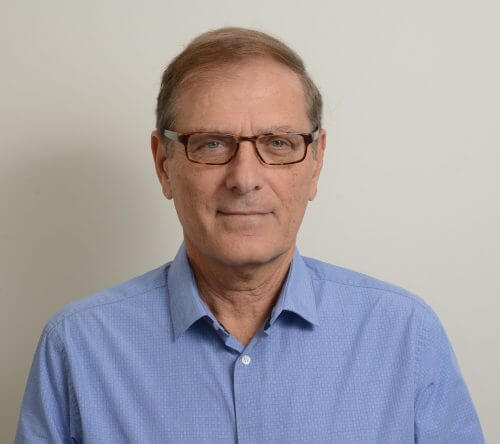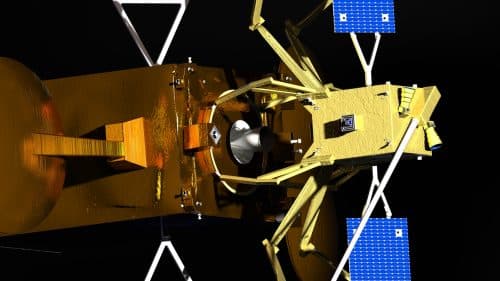An interview with Aryeh Halzband, founder and CEO of the Israeli-British start-up company Effective Space, which is developing an innovative technology that has not yet been tried in space - servicing satellites in orbit, with the aim of extending their lives. the company Recently announced on a contract worth 100 million dollars, under which it will produce and launch two small Space Drone-type satellites, which will be docked with two communication satellites after it is made and will allow their lives to be extended by controlling their trajectory and movement in space.

Last week it was reported that the Israeli-British startup company Effective Space, which is developing an innovative technology that has not yet been tried in space - servicing satellites in orbit, with the aim of extending their lives. the company Recently announced on a contract worth 100 million dollars, under which it will produce and launch two small Space Drone-type satellites, which will be docked with two communication satellites after it is made and will allow their lives to be extended by controlling their trajectory and movement in space. The CEO of the company and one of its ventures, Aryeh Helzband, was interviewed by the Hedan website on the occasion of the announcement.
What is your background?
"I have been working in the field of space and satellites since 1986. I was in the first generation of those who joined the Bambat space program - which later became the Space Administration and then the Mabbat-Space Enterprise as we know it today. Moshe Bar Lev, who was the first head of the administration, accepted me as the head of a group that handles the field of mechanical engineering of space, deputy head of the engineering administration at Mevt - a large administration that had 400 employees, and later I was appointed head of the business unit at the space manager. Then I moved to the position of director of a subsidiary of the aerospace industry abroad - responsible for marketing in a certain region and returned to manage the Mabat Halal plant in 2006 until the end of 2011. Then I retired from the aerospace industry to establish my own startup."
How did you come up with the idea of taking over communication satellites using small satellites?
"We started with the idea of using the remaining fuel for the satellites, because of the way the amount of fuel is calculated and because the amount of fuel at the end is very small and the gauges are calibrated according to full tanks, so you can't use the pressure gauges to estimate the amount of fuel, so we do a complex calculation based on the number of operations. Of course, fuel must be left to remove the satellite from its geocentric orbit and clear the place for a new satellite."
"The initial idea was to allow the operators to use the amount of fuel that is enough for more than six months of work and to sell a derailment service. After we founded the company, we did a market survey and came to the conclusion that customers want to extend life and not just take it off the track, and we started developing the product known as SPACE DRONE. Right from the start I came to the conclusion that in order to be successful you have to do it at a price that the customer is willing to pay. I wanted to make a solution based on a cheap satellite and for that it needs to be launched cheaply - and a cheap launch can be achieved by launching it as a hitchhiker - Ride Share. Such a launch requires a very small satellite with the volume of a washing machine. We worked quite hard in the first year to prove the feasibility of putting everything inside a washing machine and we came up with a solution that we think is excellent, and the market also thinks so - the volume of a washing machine weighing 400 kilos, where most of the weight is fuel."
How does a Space Drone satellite work?
"The satellite of Effective Space Performs a process of linking through docking. First, it finds the target satellite, reaches it and anchors to it. This whole process is done with the help of electro-optical sensors, image processing, and all this using algorithms that we developed."
How do you anchor on a satellite that was not designed to be connected to?
"We figured out how to dock satellites that weren't designed for that. We found a solution and protected it with a patent. We basically mimic the way the launcher is connected to the satellite. Each satellite has an interface ring to the launcher and this ring is an industry standard. It appears in three locomotives. We invented a mechanism that knows how to anchor to each of the three locomotives and imitate the way in which the launcher is anchored to the satellite during the launch."
"Since every satellite is launched by a launcher and they all have the interface ring, we can anchor on almost one hundred percent of the satellites even though they were not designed for this because our market is satellites that are already in space, not those that will be designed in the future."
The solution to reduce the use of fuel - electric drive
"After we arrived we have to keep them on track - STATION KEEPING and for that we invented a patent. The Levin has arms that each carry electric propulsion motors, which are 10 times more energy efficient than chemical combustion of fuel. This is a technology that has matured in the last decade, where the fuel is metered (usually XENON). We accelerate the ionized particles in a strong electric field and get material exiting at high speed at the mouth of the engine. According to the law of conservation of momentum, because the speed is high the momentum is also high and therefore less mass is used to get the same 'amount' of work.
Thanks to these developments, 100 kg of fuel can keep a 2-ton fuel-free communications satellite in orbit for 15 years. Since we do not assume that satellite operators will want to extend their lives for such a long period, we have developed the ability for the satellite to disconnect and move to another satellite several times according to the contracts we sign."
"It was a process of evolution and what we are doing today was not built in one day, the more you talk to customers you have to change your model and in the last six months we have achieved two significant achievements that turn us from a startup company that starts a plan to a company that is already implementing a plan. We developed a full engineering model of our docking system and proved it in the laboratory in 13 degrees of freedom, special laboratories for space docking processes that were developed - the shuttle would dock to the space station once a month. There are facilities where there is a long rail on which robots sit, each robot with six degrees of freedom and the 13th degree the distance, and in such a laboratory they simulate the connection of two satellites. In the experiment we did in Spain, we proved the capabilities of the docking system.

As mentioned recently, we signed a contract with a customer to service two of his satellites, through this we will manufacture two SPACE DRONE satellites and launch them in 2020 to serve two satellites of the same customer in the amount of over 100 million dollars.
How does a small company reach such sums?
There are no examples of a small company like ours that signed such a contract, this is an extraordinary achievement that stems from the knowledge of the market, the understanding of the material and the hard work of a team. We are working on the development and have a talented team here and in the UK.
Why Britain?
We chose to locate the headquarters there because it is easier to serve an international market from London. In addition, Israel does not have a space law and in order to provide service to satellites we must have a space law. In any case, the R&D center is in Israel and has an interesting mix of aerospace industry graduates, some of whom are retired with a lot of knowledge and still have strength in their waists, and young people who work with them. In total, we employ 25 employees and consultants.
Will the satellites be produced in Israel?
: We are in contact with a leading satellite manufacturer. The agreement has not been signed yet and I do not want to publish it. There is a priority to build the satellites in a proven place that knows how to make good small satellites. I certainly have a hot corner for production in Israel. I am Israeli and an Israeli patriot. The knowledge belongs to the company and the IP is registered in Israel, I received two scientist grants through the Ministry of Science and the Space Agency and the knowledge created in Israel is registered here."
Effective Space is a 'new space' or 'space 2.0' company. In Israel, a series of start-up companies have developed in the field of space that increase the space market in Israel and turn it from a zero sum game to an additional sum game. As long as the space industry was based on sales to the Ministry of Defense or the Space Agency - the amounts are known. The Aerospace Industry also brings projects for export, but we bring an additional amount. To this day, Israeli high-tech is thriving thanks to venture capital investments. No one will invest venture capital in Rafael or the aerospace industry. They will invest in small companies such as Spice Pharma and Nano Satcom. I have personally raised 12 million dollars to date and I employ young people who have not been in the space sector before and this gives an alternative to people who graduated from the Technion and do not necessarily want to work in the established industry. I see the project as complementary to the projects of the defense industries. A startup company will not develop a fourth-generation observation satellite, or a communication satellite that weighs six tons, but what we are doing greatly increases the Israeli space market and opens up new financial sources for it."
Have you taken care of insurance in case the launch fails or the satellites do not function properly?
Helzband: "We started cooperating with the insurance market as soon as we started working, no customer would agree that we connect with them without being insured. We will purchase full insurance that includes all phases of the satellite's life, the satellite launch, pre-launch and the mission itself. Our mission will also be insured, both the attachment and the docking as well as the provision of the service to the space, this is the remedy in case of failure."

One response